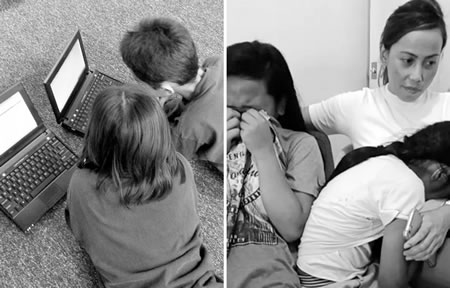
Internet Safety
Protecting children from harm is the primary duty of all adults, yet millions of children are hurt and abused in the world these days. Here at the Preda Foundation in the Philippines my mission and that of the 50 Filipino professionals who work at Preda is to protect and provide healing for them to overcome the trauma they suffered.
As a Columban missionary this has been my mission since 1974 when I founded Preda. Since then many hundreds of children have been saved from sexual abusers and recovered from the effects of online grooming and sexual abuse. It is more necessary then ever as child abuse is everywhere, and we have to take a stand to stop it and bring the perpetrators to justice.
 This year alone the Preda teams have helped several children fight their court cases for justice against their abusers and won. In fact we have achieved sixteen convictions this year alone with all but one perpetrator receiving life sentences. It will keep them from abusing more children and send a message that no one is above the law. All are accountable no matter their status or station in life.
This year alone the Preda teams have helped several children fight their court cases for justice against their abusers and won. In fact we have achieved sixteen convictions this year alone with all but one perpetrator receiving life sentences. It will keep them from abusing more children and send a message that no one is above the law. All are accountable no matter their status or station in life.
One in four girls is a victim of sexual abuse, and more and more of it starts over the internet. Every kind of psychological and sexual abuse is perpetuated against innocent children not only in the physical real world but also in the virtual world of the internet when people connect online.
The internet can be accessed by cell phone, smart phone, or laptop. The internet is a network of computers linked worldwide that provide access to information of every kind at the click of a computer mouse on a screen. Parents, guardians, and some teachers in developing countries are not computer or gadget literate. They don't know what young people are doing on their gadgets and what they see, read, watch and who they contact or who contacts them. Here lies the danger to children in this electronic age where the internet is the source of everything.
Children have a natural instinct to look to adults for guidance, support and help as they grow up in a bewildering, challenging world as they are bombarded by images, videos, messages, and contacts on social media. Also the deluge of advertisements can be disturbing and lead them into harmful dependency on junk food and growing obesity because of internet and TV advertising.
However, the greatest danger to children comes from adults and teenagers behind the screens, lurking on the internet and social media platforms. There are the teenagers that bully other children on social media, teasing and shaming them. Some children are driven to suicide because of this online abuse. Parents have the obligation to challenge and confront these bullies and bring them to court.
Many pedophiles looking for sexual satisfaction seek to contact children and lure them into relationships over the internet through social media.
In years past, children only had to be protected from strangers in the community and porn magazines. Today teachers, community workers, parents and guardians must know and understand that the electronic gadgets the children and youth must have these days are not harmless toys.
They are advanced communication tools that contain dangerous images, videos, games, and messages. They can be used to compel children to search and find dangerous content through connecting to websites and blogs on the internet promoting child or adult sexual abuse, games that portray violence, and killing and murder as acceptable "fun and games." Drug dealers offer dangerous drugs for sale. Adults posing as teenagers invite secret relationships with youth. Then there are the extremists that peddle their extreme political views and cults that invite and attract the young people and brainwash them and win them to their allegiance.
All these dangerous lures are sent directly to the child's smart phone or tablet if it is not properly configured to block all such content. Parents and guardians have to protect their children from these serious traps, lures, and temptations. They must take a strong stand with their children and have a technician set the phone or computer to a safe mode to block such content. But that is only a first step; the child can get that dangerous access on a friend's gadget or in a computer shop. This is where education of children must include the dangers of the forest. It's not the primeval jungle where evil lurks, but the forest of the internet.
A close, trusting and caring relationship between parents and children is the most important protection. Direct talking and teaching moral values to children from an early age is essential. They will then be morally smart and committed to know and do what is right and avoid wrong.
Their respect for their parents must be based on the good example and morally upright life of their parents. It's often when parents fight and break up that life of a child breaks up too. As it deteriorates, they turn in loneliness and despair to the internet to find friends. Most frequently the so-called friends they meet are really enemies out to exploit and abuse the children.
Nowadays parents, teachers, and police have to be alert and aware that there are thousands of pedophiles luring and enticing youngsters online over the internet to be their friends and confidants.
Sometimes older men will pose as younger teenagers to attract a teenager. The young person, especially if they are in any way lacking parental affection and are lonely, or victims of bullying at school and seeking friends, are the most vulnerable because they go surfing online to find relationships, especially on social media. There they can send messages to someone asking, "Can I be your friend?" They are then invited to chat and share information about themselves.
The sex predator will then disguise his age and "groom" the victim with false information about himself, his hobbies, lifestyle and schooling. The child victim will usually tell the truth about him or herself. They are flattered when they send a photo. They are given attention and promises of gifts if they ever they meet.
After some time —weeks, and months even — the child is captivated by this new, supposedly kind and loving friend who gives advice and support and understands the child's problems and conflicts with their parents and classmates. The child is then like an innocent fly caught in the spider's web of the grooming pedophile. When this trust is established, the groomer can send photos of himself or of another whose identity he has adopted—sometimes even sexually explicit photos are sent — and similar photos are expected in return. Each sexual predator has his own technique to seduce and lure his unwitting victim into an emotionally dependent relationship.
They will arrange to meet secretly, and the grooming is then person-to-person. If the older man has posed as a younger one, he has an excuse why his young friend suddenly can't come. He then continues the grooming. Soon the older man will listen to the problems, develop rapport, understanding and at a later meeting will embrace the teenager, be caring and then touching and sexual abuse happens. The relationship is often allowed and tolerated by the teenager—especially if the abuser gives the teenager gifts and money. "Friendship" develops trust, and the victim then promises to tell no-one as advised by the abuser.
Parents and relatives and brothers or sisters will notice a change in the personality of the child victim. They become secretive and lock themselves away in their room with their computer or are always going to an internet shop. They go out alone; don't return home until late, even stay out and become accomplished liars with cover stories to hide their new relationship. Their parents and friends may challenge and question them, but they will withdraw all the more and become isolated. The disagreements with family drives them closer to and more dependent on their abuser.
At this stage, the teenager is being damaged, and they often show signs of anxiety, become quarrelsome— even rebellious—or can drop out of school and become depressed, isolated and abuse alcohol and drugs. The pedophile will introduce the victim to these dangerous substances, and the victim will develop an addiction.
The child does not realize how they have changed or that they are victims of sexual abuse and exploitation. In the later stages of abusive relationships, which can go on for years, the victim grows older but is trapped in the relationship and can't get out of it because of the shame and fear of exposure. With no-one to trust and no-one to tell, and not knowing where to get help, they can be severely damaged.
At that point, negative self-harm with the slashing of the wrists or overdosing on dangerous drugs will set in. There can be anger at the abuser and frustration at being emotionally captive by him, and this dependency can lead to attempted suicide.
There is another kind of child and youth abuse over the internet or by smart phone and that is called "sexploitation." This is another form of criminal behavior by the abuser. The predator follows the same path as the pedophile described above but when the teenager believes and trusts that he or she is in contact with a boyfriend or girlfriend and is induced to have feelings of attraction, he or she will be "dared" to show their private parts or to do sexual acts to themselves on live camera, send sexually explicit pictures of themselves and then the so called "friend" has it all recorded.
Then the extortion begins and emails are sent to the victim threatening that the videos will be posted online and sent to their parents, classmates, and friends. This is a devastating crime. Money is demanded, sometimes on a monthly basis to prevent the explicit images being shared or sometimes for a onetime payment for a huge sum of money. If the teenagers can't ask for help or pay it, they may commit suicide.
With trusting, caring, understanding relationships with their children from early childhood parents can prevent online abuse children will allow parents to access their gadgets. If the parents have a trusting open relationship with each other, their children will not feel excluded or uncared for and unloved. Loneliness is often the beginning of online grooming and abuse of children. The good loving example of parents is what forms the personality and character of the child and keeps them safe and internet-smart.
Columban Fr. Shay Cullen lives and works in the Philippines.


 The Columbans are a society of missionaries, including priests and lay people, who minister to people of various cultures as a way of witnessing to the universal love of God.
The Columbans are a society of missionaries, including priests and lay people, who minister to people of various cultures as a way of witnessing to the universal love of God.